Table of Contents
| You have not been in Lanzarote if… FOOD – You haven’t done a volcanic wine tasting in La Geria! ACTIVITIES – You haven’t surfed at Famara beach! SOUVENIRS – You didn’t buy bath salts from volcanoes! |
Introduction
We know how you feel about winter. Cold, dark, and just plain awful, right? Well, we’ve got just the thing to warm your heart and brighten your day!
Imagine escaping to a paradise where the sun is always shining, the sea is as blue as the deepest ocean, and the temperatures are just right all year round. Sounds pretty good, doesn’t it?
Lanzarote, one of the Canary Islands, is the perfect place for you to kick back, relax, and enjoy some serious fun. In this article, we’ll show you what to see in Lanzarote in a 7-day itinerary with a rental car.
So, get ready to pack your bags and start your journey! We’d love to hear your ideas and answer any questions you may have! Please leave them in the comments box and we’ll get back to you as soon as we can.
How to get around in Lanzarote?
There are so many ways to explore Lanzarote’s natural beauty and attractions! One of the best ways to get around, that we have opted for and that we highly recommend, is to rent a car.
This is the perfect way to explore the island at your own pace and enjoy the freedom to go wherever your heart desires! You can rent a car at Lanzarote Airport (ACE) and in some of the island’s major cities, including Arrecife, Puerto del Carmen, Costa Teguise and Playa Blanca. We’d love to help you get the best deal, so booking in advance is a great idea! Just remember to have a valid driving licence. Click here to compare rent car prices! In this article we present a 7-day itinerary with rental car!
A moment of attention, remember that we present a 7-day itinerary with rental car here!
If don’t want to rent a car, you’ll have to accept that you have less freedom to travel and rely on the rigid timetables of the local public transport system. The main operator is IntercityBus Lanzarote, which offers connections between the main cities and tourist attractions. The most popular lines are Line 1 (Arrecife – Playa Blanca), Line 3 (Costa Teguise – Puerto del Carmen) and Line 9 (Arrecife – Orzola). Buses are a great, cheap way to get around, and they’re pretty reliable too! The only thing to keep in mind is that timetables can be limited and don’t cover all of the more remote areas.
You’ll find taxis easily in the major cities and near the tourist attractions. They’re a bit pricier than buses, but they’re perfect for short trips or emergencies! Just a friendly heads-up: it’s best to stick to official metered taxis.
If you love getting out and about on two wheels, bike rental is a great option for you! If you’re looking for a fun way to explore, you can rent a bike in many cities and tourist resorts. This is the perfect way to explore local areas and stay fit! It’s always a good idea to wear a helmet and pay attention to road conditions and traffic.
If you’d rather not worry about getting around, you can always go on a guided tour! There are lots of great organised tours, like bus tours, jeep safaris and boat trips. You can easily book them through your local tourist agency or at your hotel.
Exploring on foot is a wonderful way to discover the charms of towns, beaches and nature trails. It’s a great idea to bring water, sunscreen and a map or navigation app.
Where to sleep
When choosing where to stay, you must consider proximity to the attractions you want to visit and the type of experience you’re looking for. You should definitely book in advance, especially during the high tourist season (June to September), to ensure you find the perfect accommodation for your needs.
Our advice for a 7-day itinerary to discover Lanzarote is to stay overnight in Arrecife. Located just 10 minutes from the airport, this quiet and characteristic town is perfectly positioned to reach all the main attractions in just 40 minutes by car. Furthermore, Arrecife offers the cheapest options on the island!
You could also stay overnight in Puerto del Carmen, one of Lanzarote’s most popular destinations. It’s known for its sandy beaches, restaurants and lively nightlife. Puerto del Carmen is the ideal choice for those seeking luxury and comfort.
If you’re looking for relaxation, Playa Blanca is the place for you. Located on the southern coast of the island, it’s famous for its quiet beaches and high-quality resorts.
Furthermore, you should definitely consider Costa Teguise, which is particularly loved by families and surfers. Teguise is also an excellent choice for those interested in history, while Famara is an ideal location for surfing and nature lovers.
What to see in Lanzarote: our 7-day itinerary by car
Here’s our 7-day Lanzarote itinerary with rental car. We’re confident that a week is enough time to see all the island has to offer. Leave your questions in the comments or add your own ideas if you’ve already been.
Day 1 – Papagayo Beach and Playa Blanca
You can dedicate the first day to visiting the southern part of the island and reaching the Parque Natural de Los Ajaches. You will not find an asphalt road leading to Papagayo beach. The only road is dirt, so you will need additional insurance coverage for this type of road taken out when picking up the car.
If you don’t have this, park in Playa Blanca and walk to Papagayo Beach. It’s a 2km trek overlooking the sea, with a multitude of coves with crystal clear water. You can stop at any of them or continue straight to the last beach, Papagayo, a true pearl of Lanzarote.
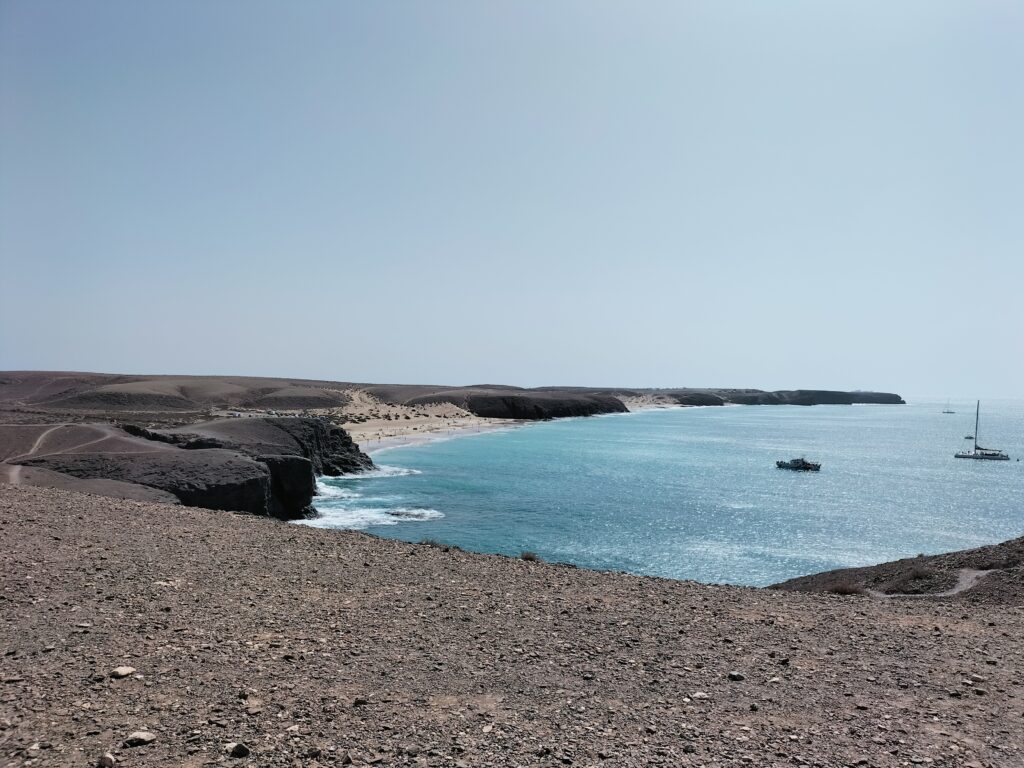
Make sure you stop for lunch in one of the little restaurants just up the Papagayo Beach hill. They aren’t super cheap, but the view overlooking the sea is worth every penny. If you want to save money for this day, we recommend you bring a packed lunch and maybe just order a coffee or lemonade in one of these places.
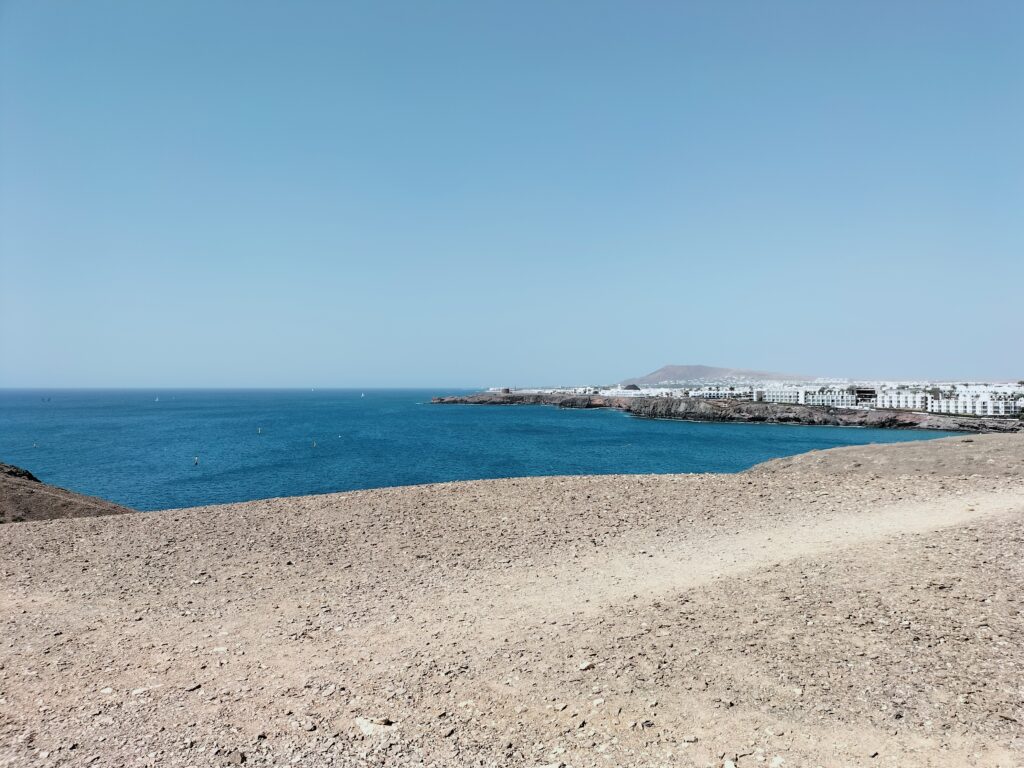
You mustn’t forget your sunscreen. The trek is long, depending on where you park, and the sun and wind are strong all year round.
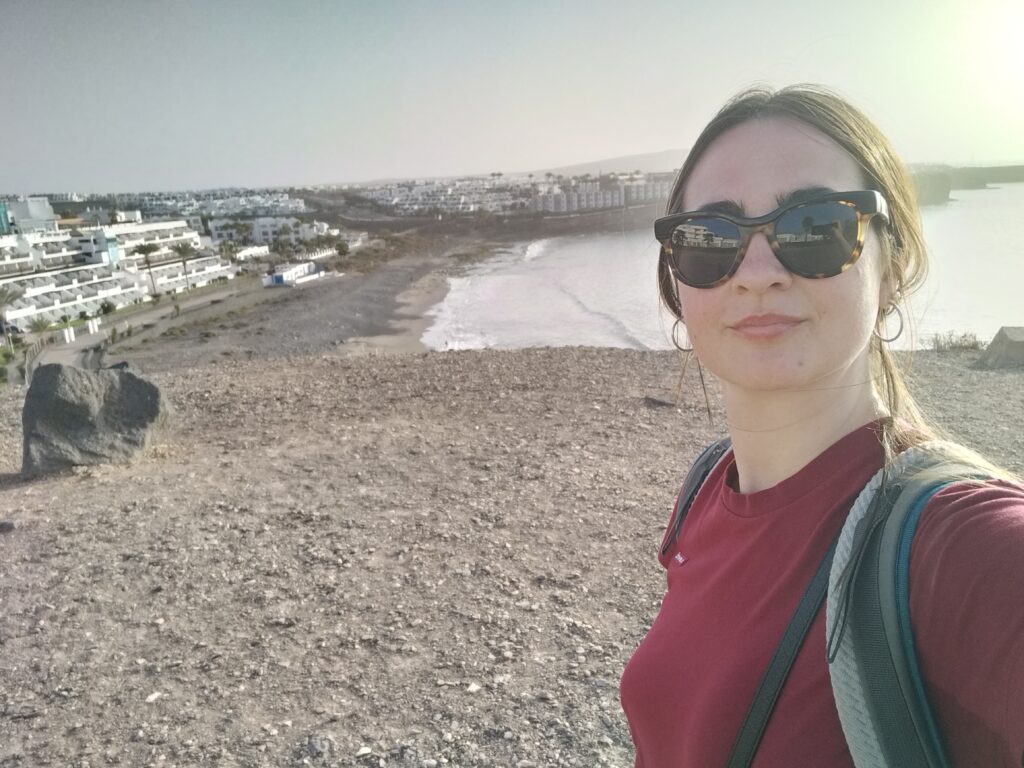
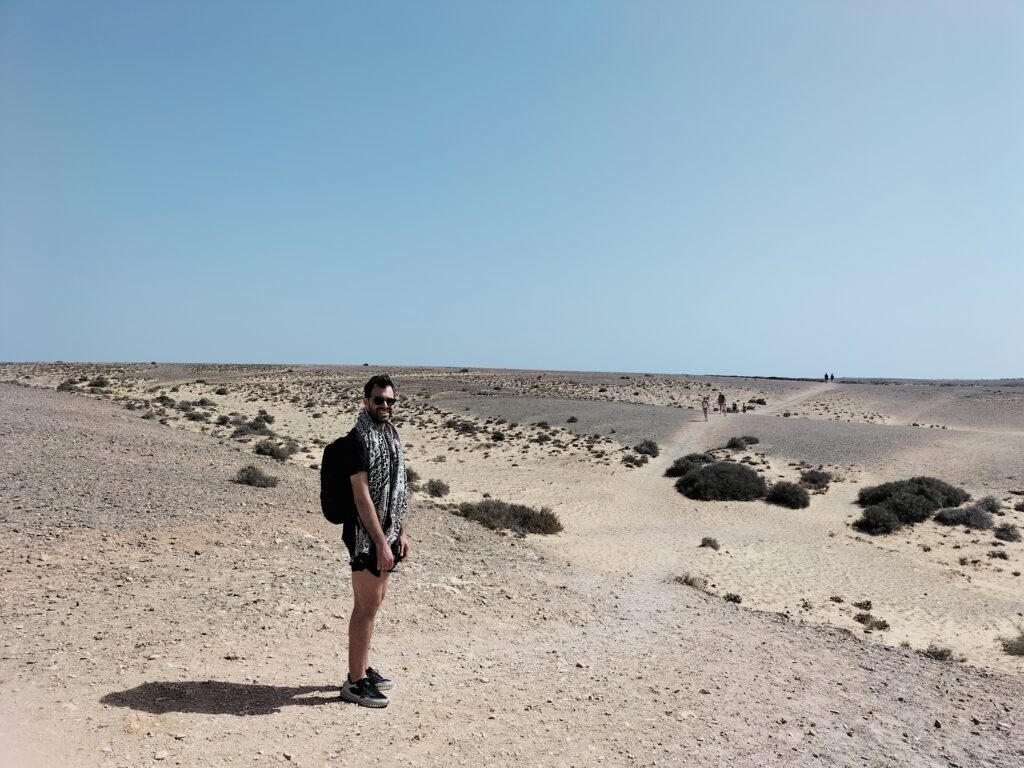
Once you’re back in Playa Blanca, you simply have to visit the coastal town and stop for dinner at one of the many restaurants along the seafront. We ordered here the best paella you’ll ever taste!
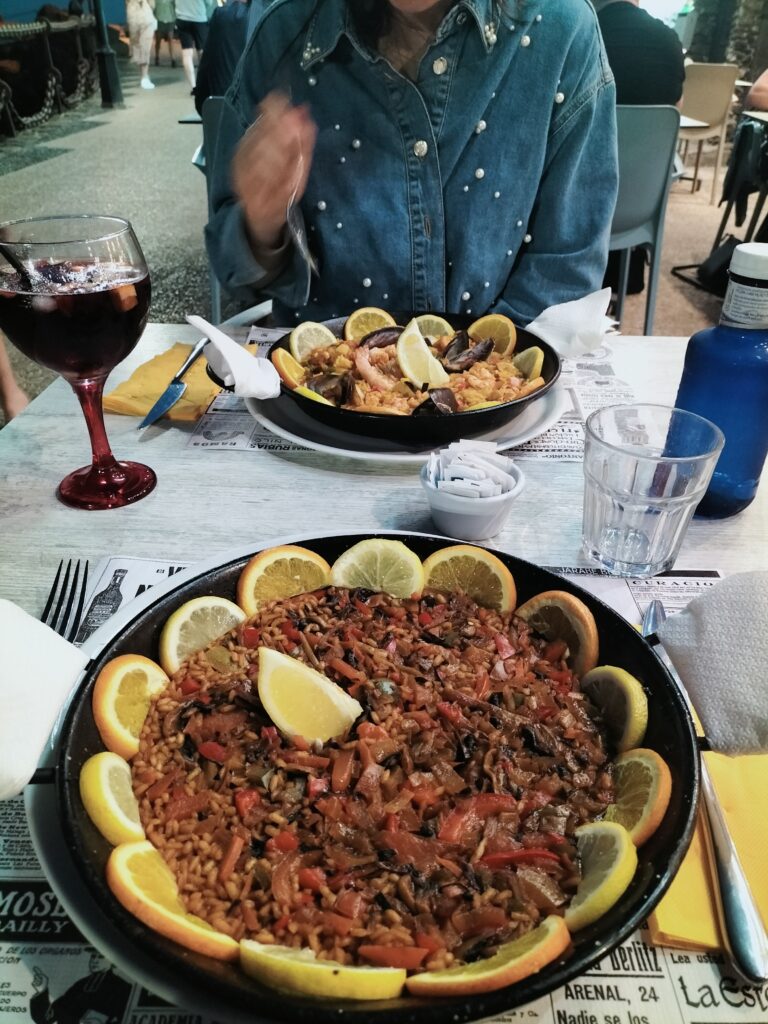
Day 2 – Famara Beach, Teguise and Costa Teguise
On the second day, get up early and head to the gorgeous Famara beach, in the north of the island, a true surfers’ paradise. We took part in a surf course at one of the many surf schools in the very small town next to the beach. Click here to find the course that’s perfect for you!
We bought a 2-hour course at “Red Star Surf” (50€ each), but you can also do a 4-hour course with video footage, which is double the cost.
In the morning, the beach is filled with lots of people who want to try this fun activity at any level, from beginners like us to professionals. Surfing in this location is practised by anyone thanks to the unique shape of the bay which protects the water in front of the beach and ensures a shallow, sandy seabed all the way out to sea. In short, it is one of the best places in the world to learn to surf – no excuses!
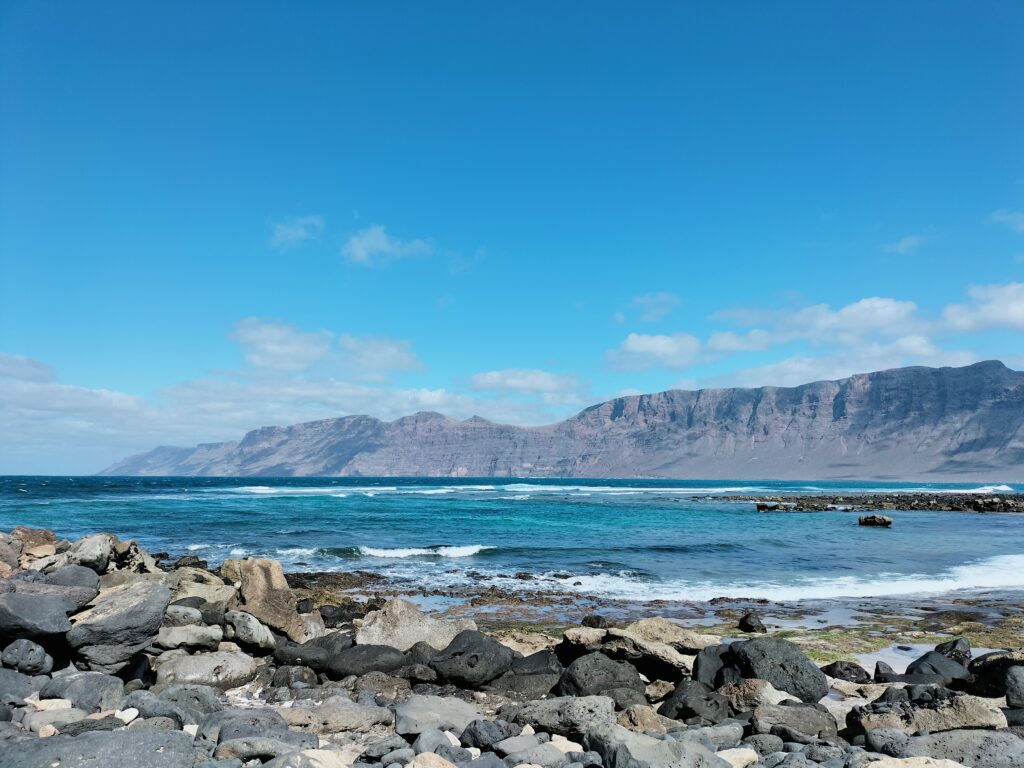
And there’s more! You can also take yoga lessons overlooking the ocean. We tried this too and it was just what we needed to relax and unwind. Check the availability here!
We had lunch in a good place in the lovely town of Famara, just a hop from the beach. After lunch, we went to soak up some sun on the beach.
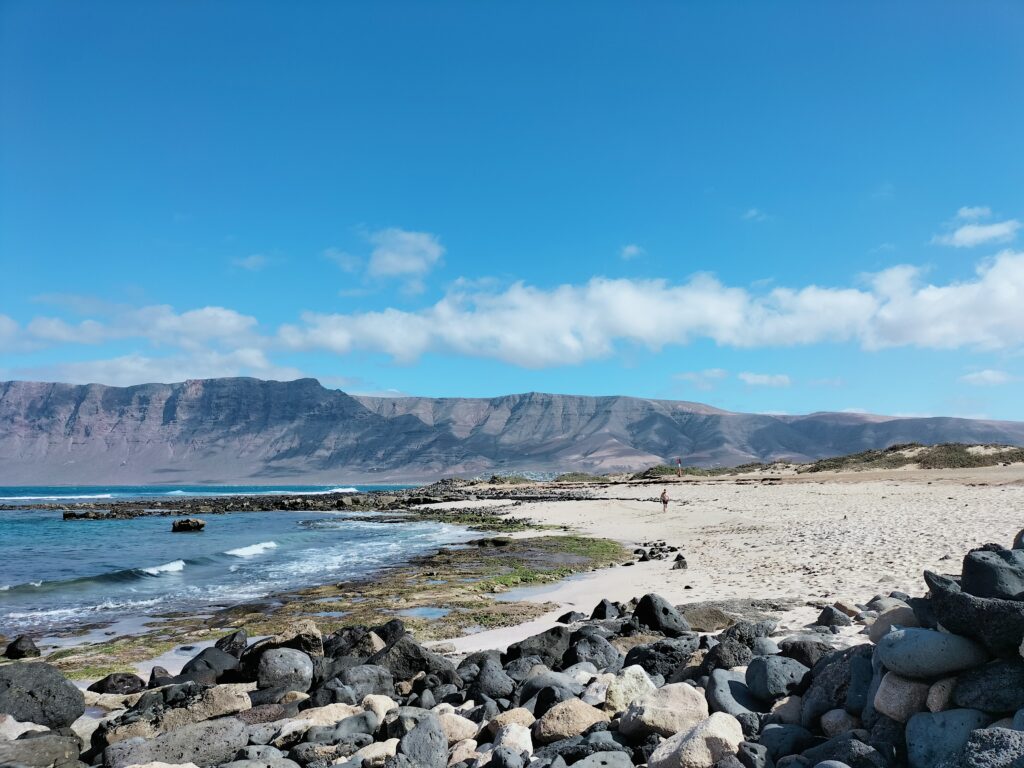
Then we set off to explore the island’s interior, with a special stop in the charming town of Teguise, which was once the capital of Lanzarote. You’ve got to take the time to walk around the small centre and have an aperitif in one of the many bars you’ll find there.
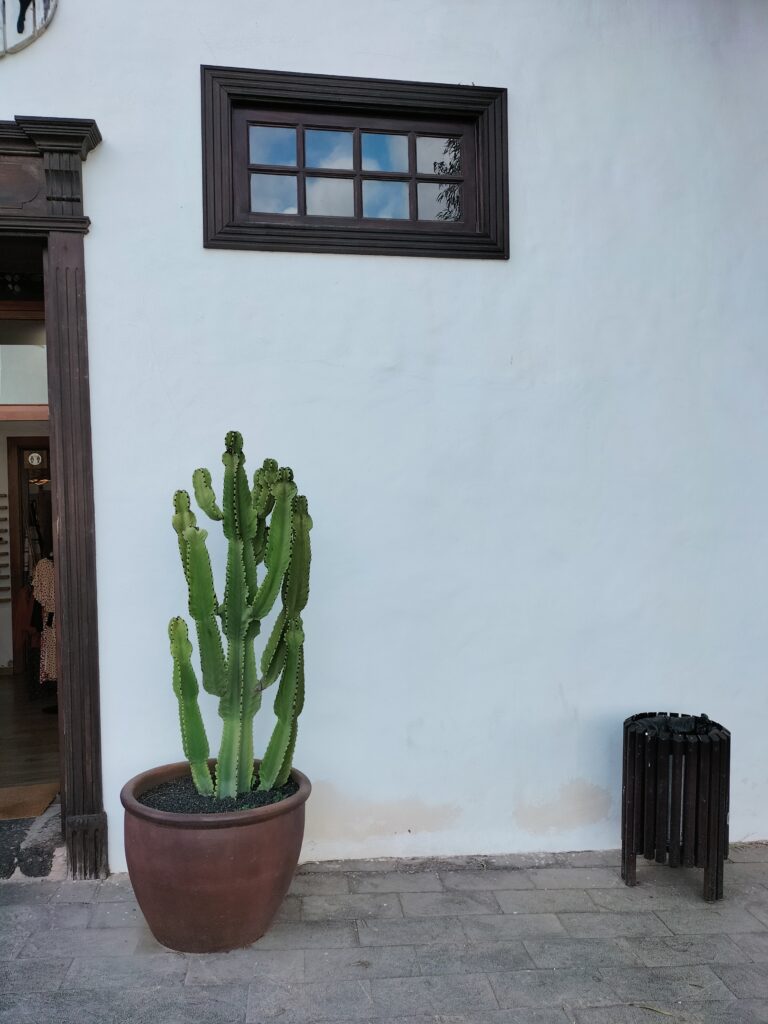
Teguise is such a lovely, quaint town with its typical white houses. It’s one of those places that really sticks in your mind. In the evening, hop back into the car and head towards Costa Teguise, another lovely coastal town in the east of the island where you can dine in one of the many seaside restaurants.
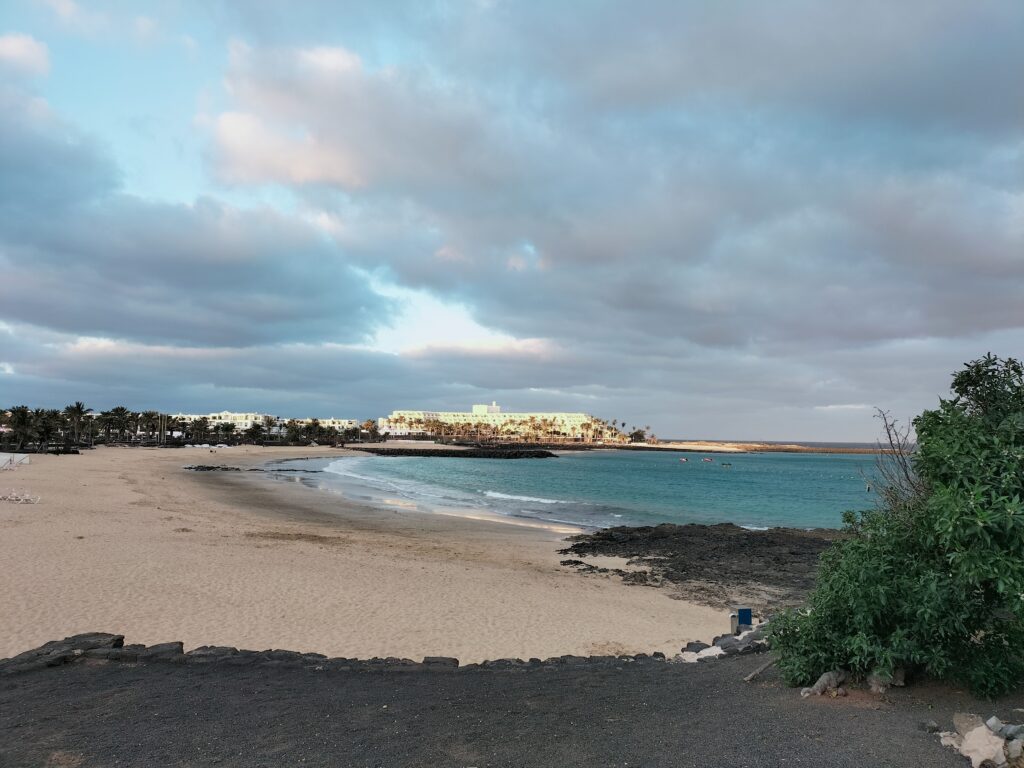
Day 3 – Timanfaya, la Geria, Los Hervideros and Janubios Salinas
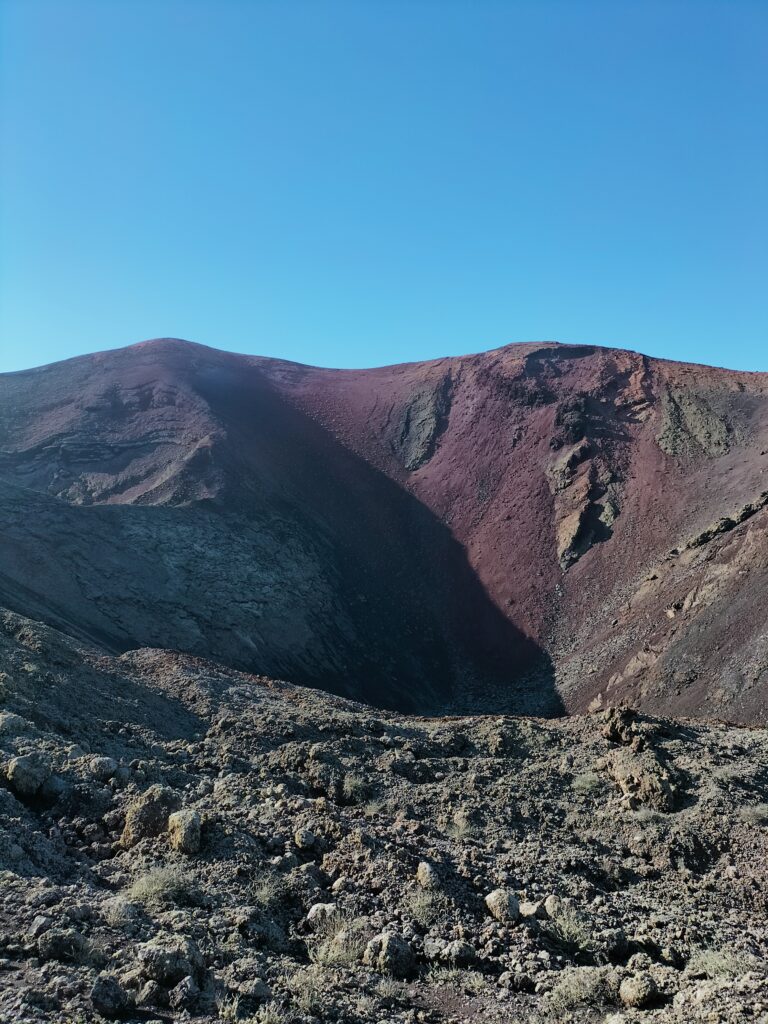
On the third morning, head out to the amazing Timanfaya National Park to take in the incredible volcanic landscapes that make Lanzarote so special. It’s a highlight of any trip here! The great thing about the park is that it’s really easy to get to by car from anywhere on the island as all main roads lead right to the entrance!
If you don’t have a car, don’t worry! You can easily join one of the many organised tours that depart from major tourist locations such as Arrecife, Puerto del Carmen and Playa Blanca.
The only way to explore this amazing park is by coach, so you’ll have to park your car in the El Diablo restaurant car park and hop on a dedicated coach, which will take you on a journey to another planet in just 40 minutes! This lovely tour takes you through the most spectacular landscapes of the park, with friendly explanations in different languages about the volcanic eruptions and geology of the area.
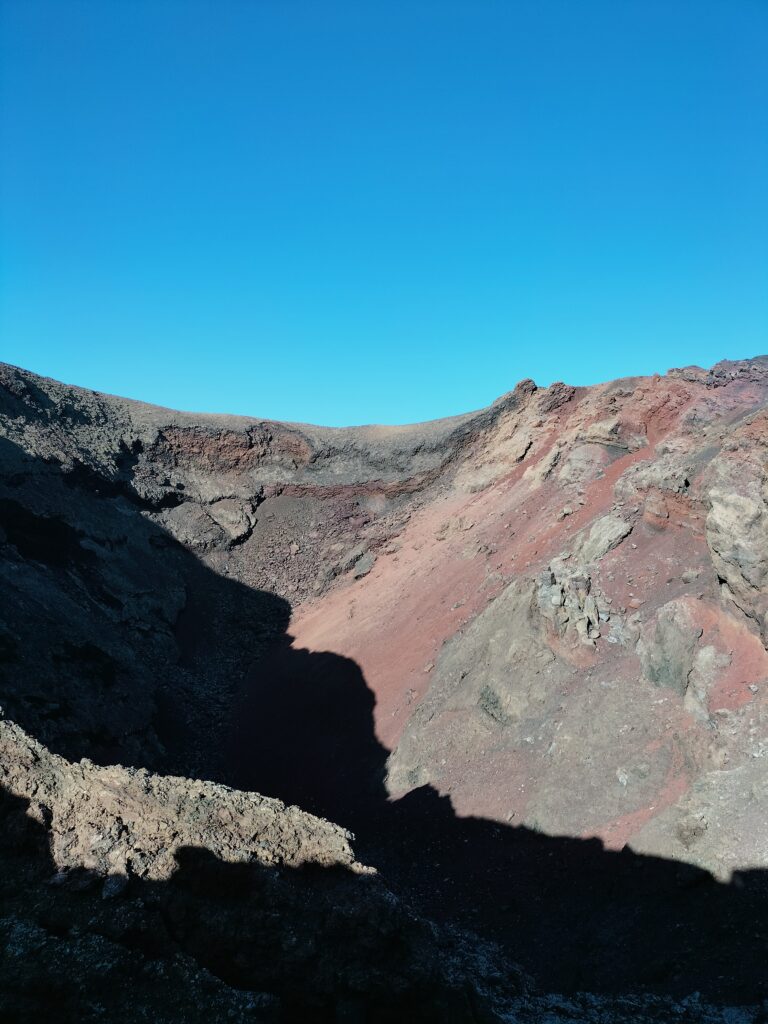
Once you’ve finished the tour, you can head over to the El Diablo restaurant to watch some fascinating geothermal demonstrations. The lovely staff there will show you how subterranean heat can ignite bush branches or instantly boil water – it’s really quite incredible! And if you’re feeling peckish, you can tuck into lunch at the restaurant (it’s a bit pricey!).
This lovely venue, designed by the renowned local artist César Manrique, is special because it uses natural geothermal heat for cooking. You’ll love this! Dishes are cooked on a grill placed above a crack in the ground from which volcanic heat emerges.
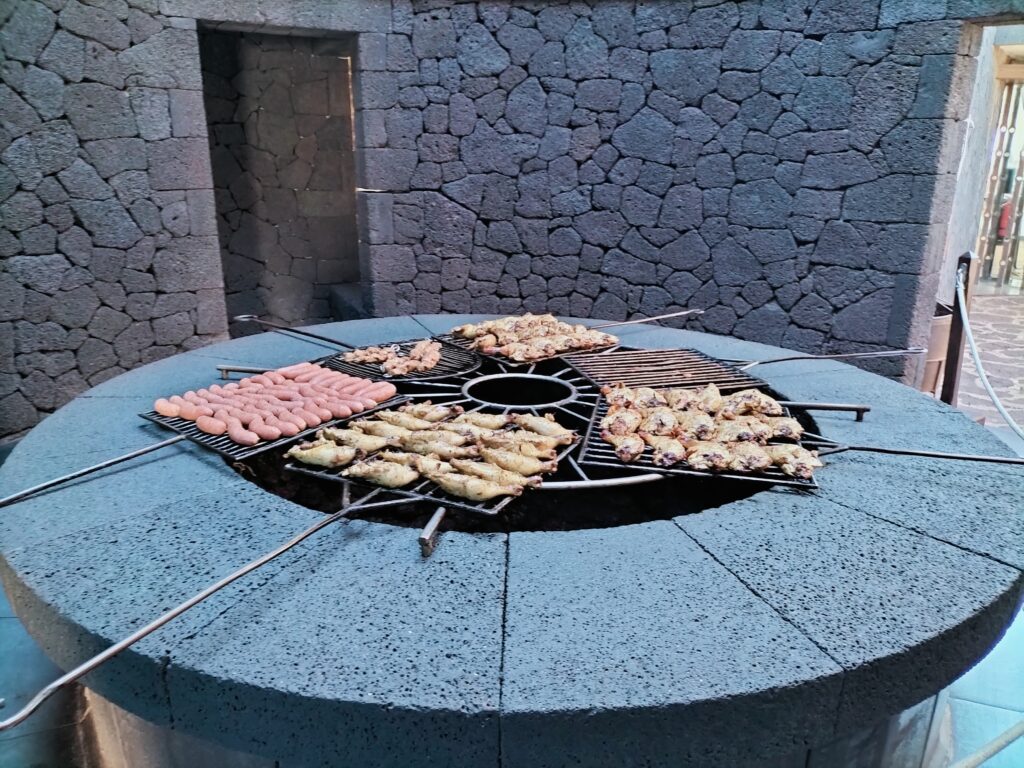
And don’t forget, the park is open every day of the year, usually from 9:30am to 5pm (last entry 3:45pm). Just a heads-up, times may vary, so it’s always a good idea to check before you go. The entrance fee to the park includes the bus tour of the Montañas del Fuego, which we think you’ll really enjoy! You can buy tickets at the door or online here.
Once you’ve had a lovely time at the park, why not head to La Geria, Lanzarote’s wonderful wine region? Even if you’re not a wine expert, we really think you’ll love visiting one of the wineries and tasting the delicious local wines produced in the volcanic vineyards.
We really think you’ll love visiting Bodega El Grifo! It’s one of the oldest cellars in Spain, founded way back in 1775. Here you can also visit the Wine Museum, which offers an overview of the history of wine cultivation on the island. Check here for all the info.
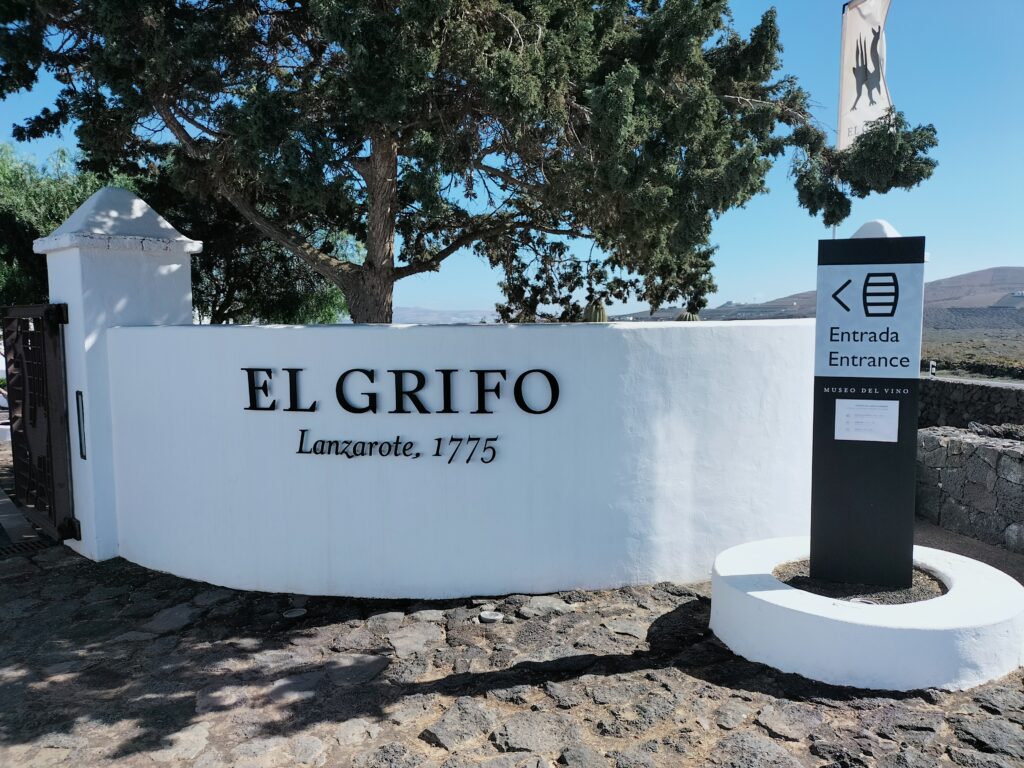
Lanzarote’s winemaking techniques are truly unique in the world! They’ve developed in response to the particular climatic and geological conditions of the island, which makes them all the more special. The volcanic soil, low rainfall and strong winds have led to the creation of some pretty innovative methods of growing vines!
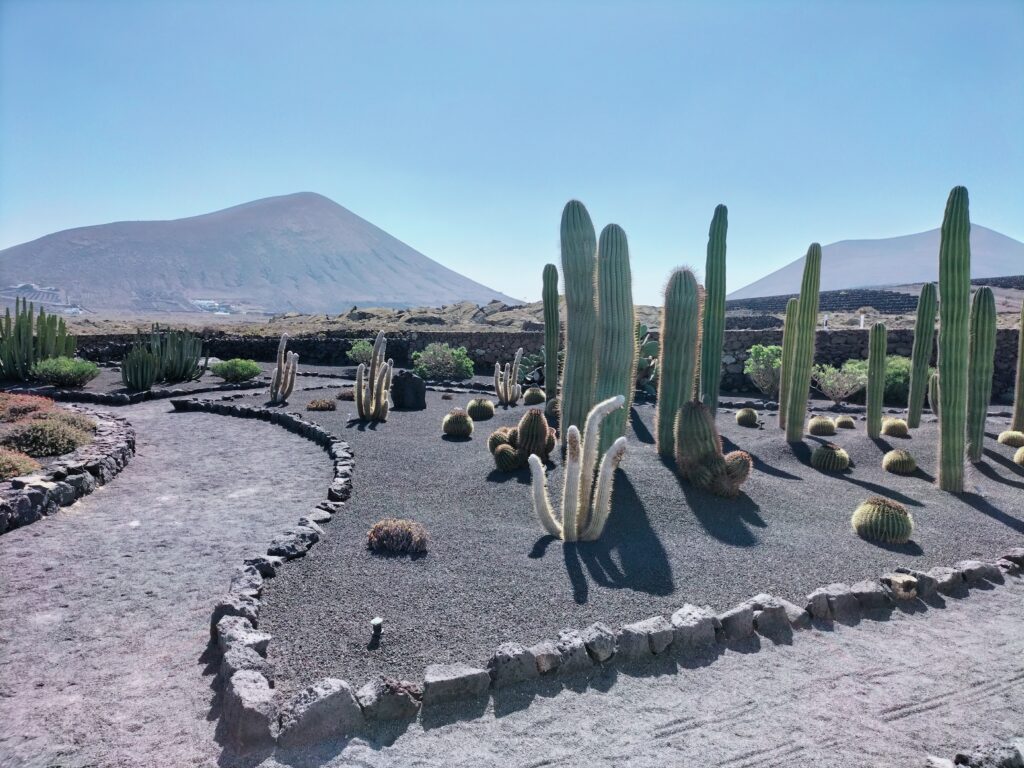
Lanzarote’s most distinctive technique is the cultivation of vines in “hoyos” (holes) dug into the volcanic soil. It’s a fascinating process! These lovely little holes, which can be up to 2 metres deep, are perfectly circular and about 3-4 metres in diameter. Each hole is home to just one vine, keeping them safe from the wind and moisture.
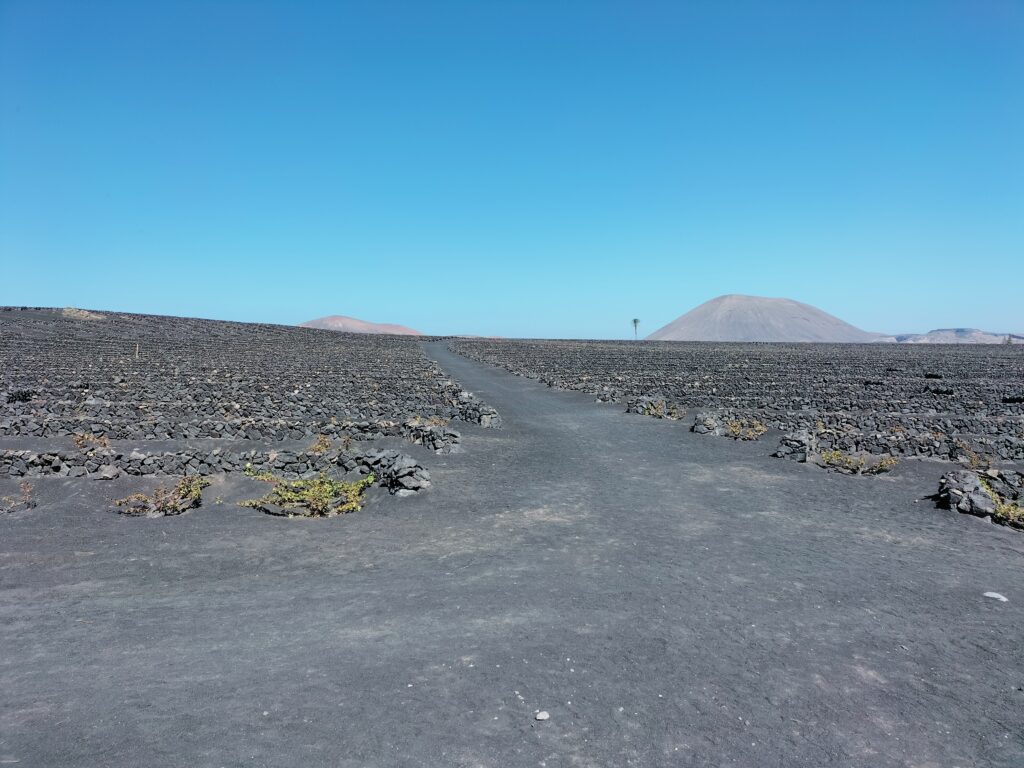
Winemakers build small semicircular stone walls called “zocos” around each hoyo, which help to protect the vines from wind and sand. As for native vines, Lanzarote is famous for the cultivation of the Malvasia grape variety, which is particularly suited to the conditions of the island. And there are other lovely varieties that are cultivated here too, including Listán Blanco, Listán Negro and Diego.
After you’ve enjoyed the tasting, why not head to the far west of the island? You’ll find a Martian landscape shaped by the last explosion of the Timanfaya volcano, which happened some 300 years ago.
There are two lovely attractions in this part of the island, and they’re quite close together. First, you’ve got to check out Los Hervideros (or “the boiling waters”), a series of truly spectacular volcanic cliffs. Once you’ve parked your car, just follow the well-marked paths and you’ll be able to explore the cliffs and admire the waves crashing into the caves and holes formed by the solidified lava.
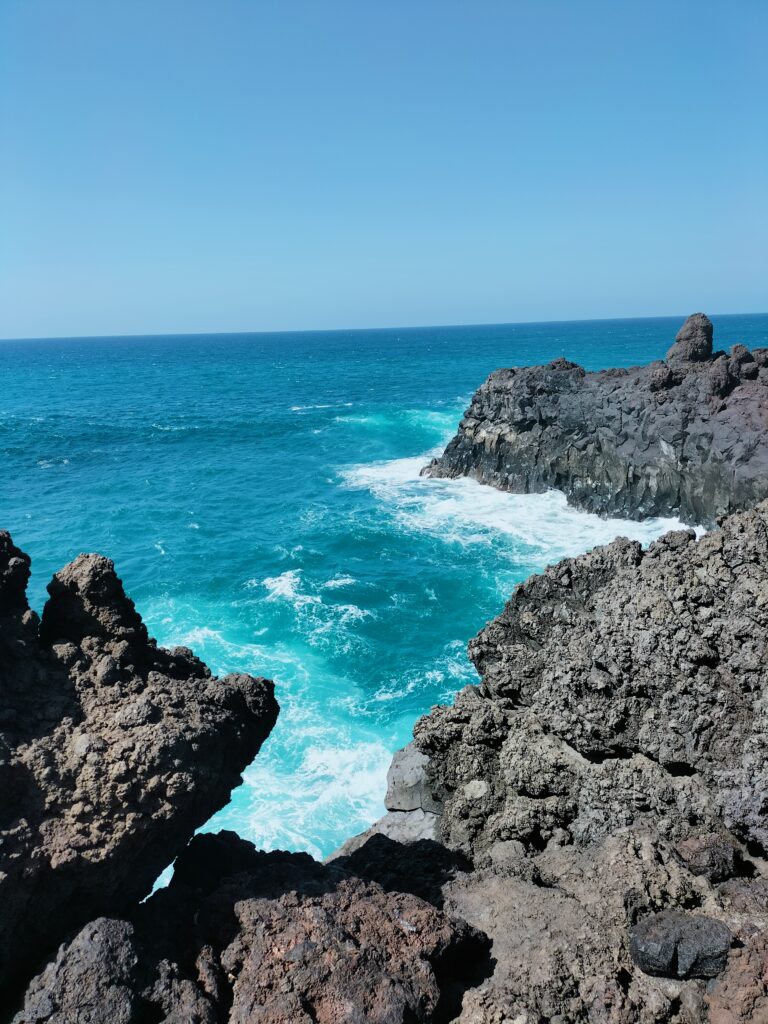
There are so many lookout points that offer spectacular views, especially at high tide and when the sea is rough!
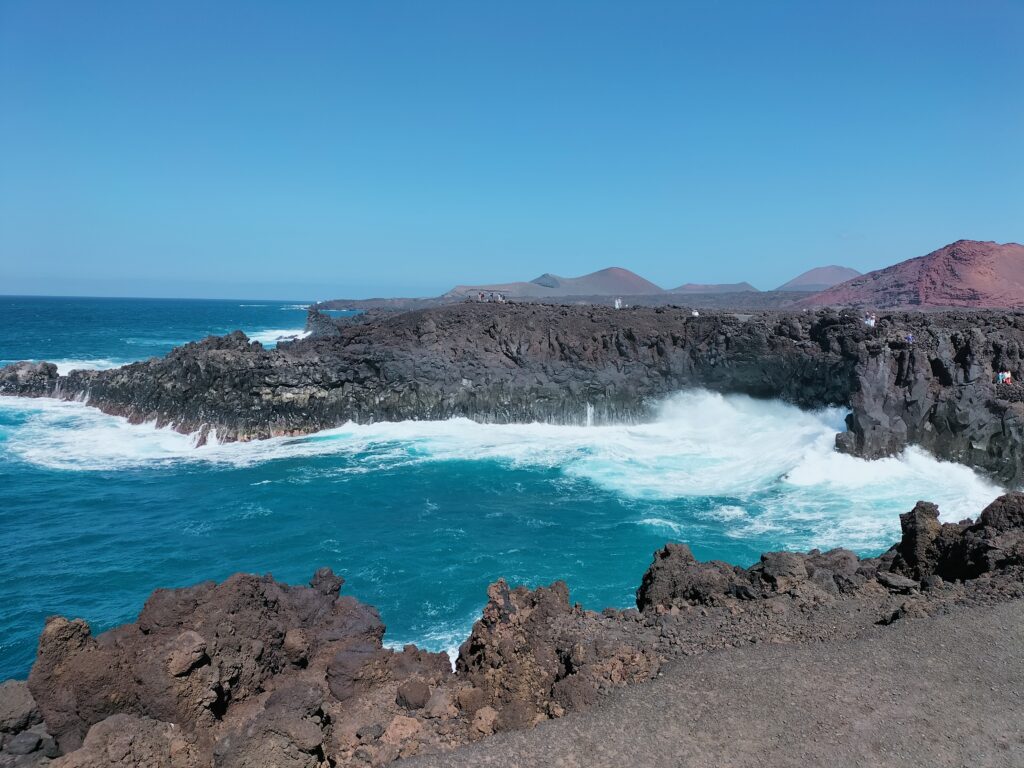
Then, you’ll want to head to the Salinas de Janubio, the largest natural salt pans in the Canary Islands and one of Lanzarote’s most fascinating cultural and scenic attractions.
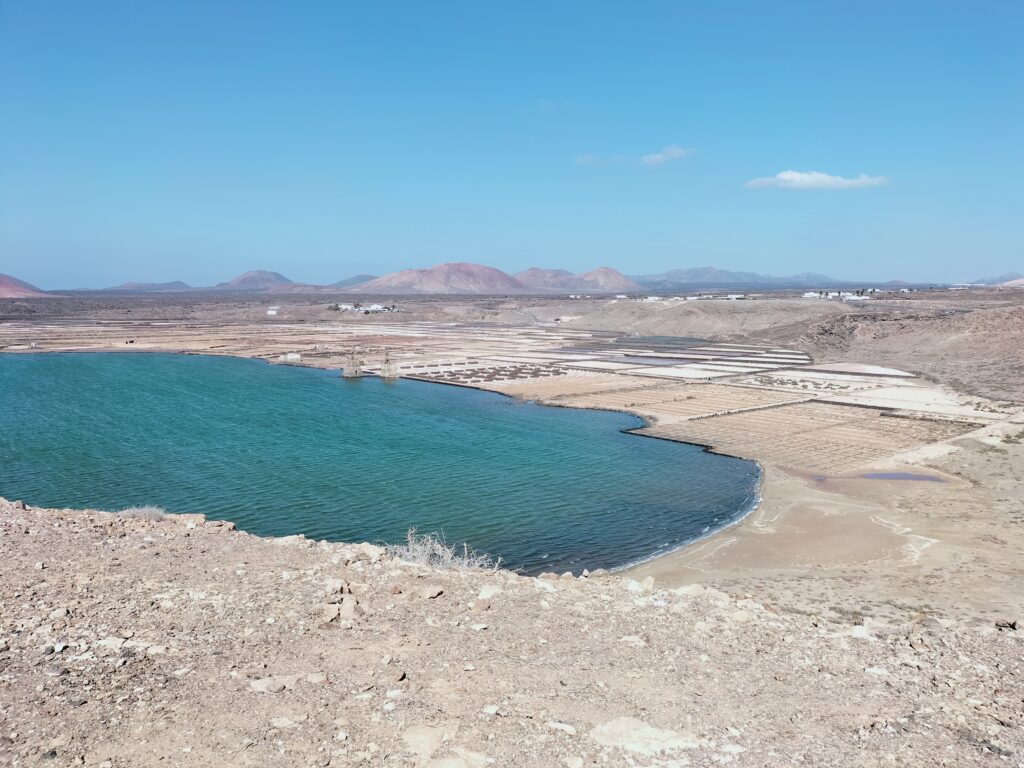
Day 4 – Montaña Cuervo and Playa Blanca beach
In the morning, we went on an excursion to the gorgeous Montaña Cuervo. Then, in the afternoon, we relaxed on the beautiful Play Blanca beach. If you’ve already had the pleasure of visiting on day one, why not explore another nearby beach? We’d highly recommend the ones around Puerto del Carmen!
We really recommend doing the excursion to Montaña Cuervo early in the morning to avoid the intense heat. It’s one of the most fascinating experiences for nature and geology lovers! Located in the stunning Volcanoes Natural Park, near the town of La Geria, this incredible place offers a spectacular volcanic landscape and a unique opportunity to explore a volcanic crater from the inside.
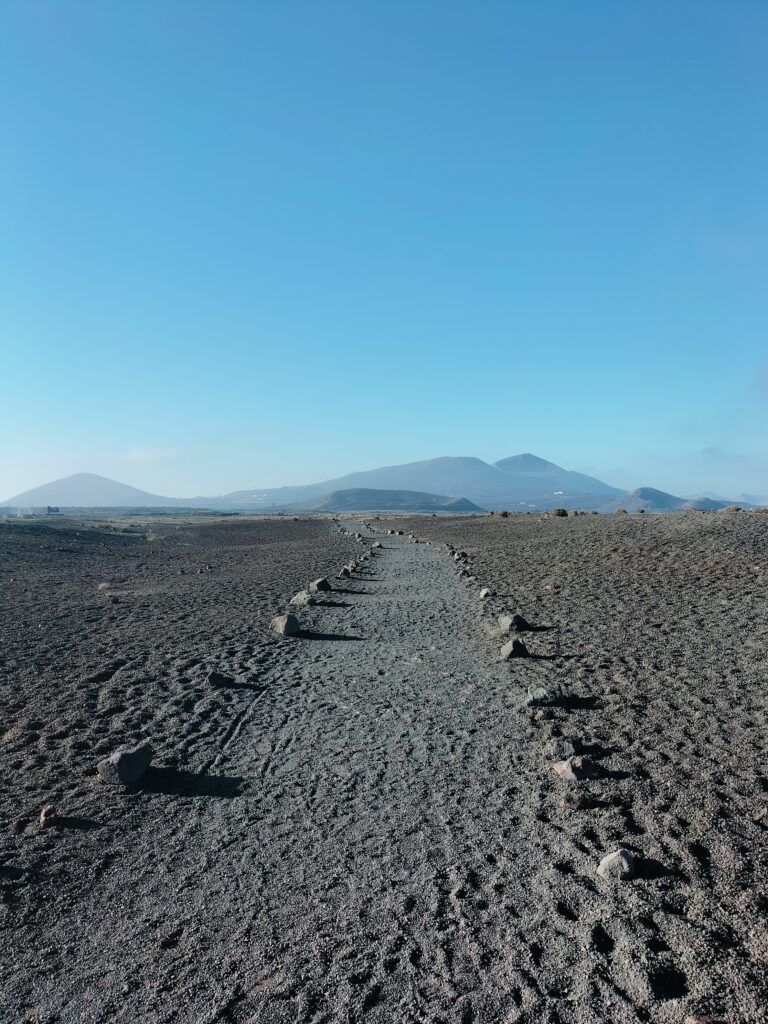
From Arrecife, the capital, it’s just a 20-minute drive, while from Puerto del Carmen and Playa Blanca it’s about 15-30 minutes. If you’re coming by car, just take the LZ-2 road until you reach the detour to La Geria on the LZ-30. Just follow the signs for Montaña Cuervo and you’ll find a lovely car park near the entrance path.
The lovely hike starts right from the parking lot, where you’ll find a well-marked trail that will guide you towards Montaña Cuervo. The route is really very easy, and it’s also great for families with children! This lovely circular trail is about 4.5 kilometres long and can be completed in about 2 hours, depending on how fast you walk and how often you stop to admire the views!
As you stroll along the trail, you’ll be treated to some truly breathtaking views of the surrounding volcanic landscapes, including solidified lava fields and other unique geological formations.
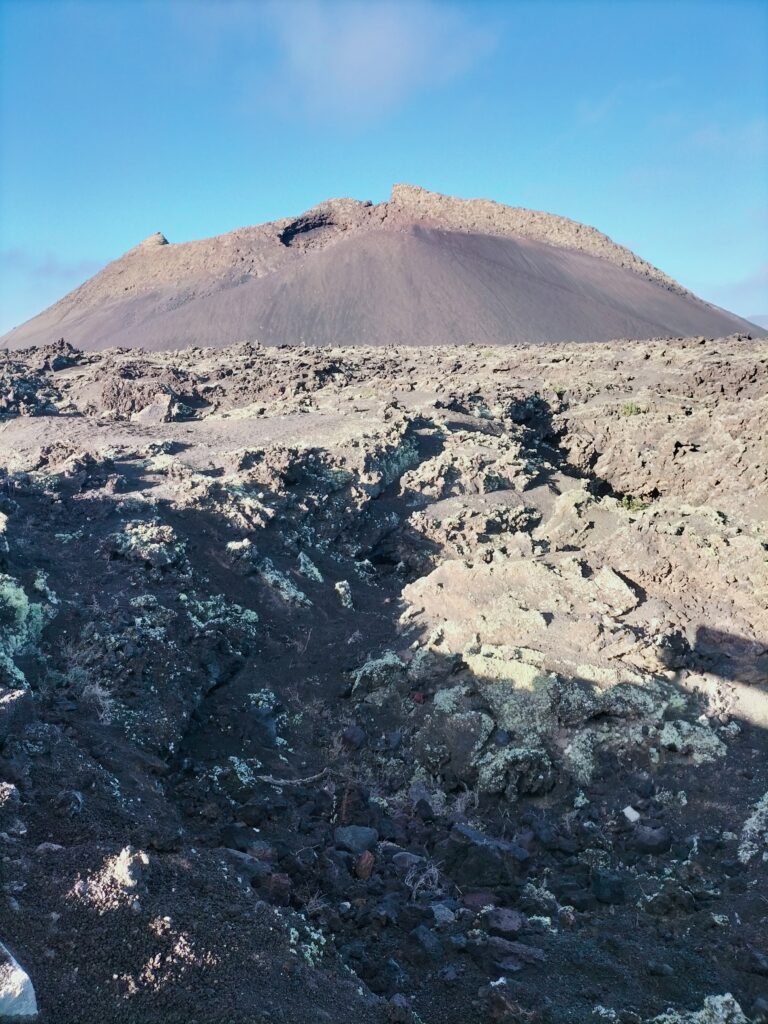
One of the really special things about this trip is that you can actually go inside the volcano’s crater! The trail will take you right inside the crater, where you can explore the volcanic terrain and admire the crater walls up close. It’s a truly special experience!
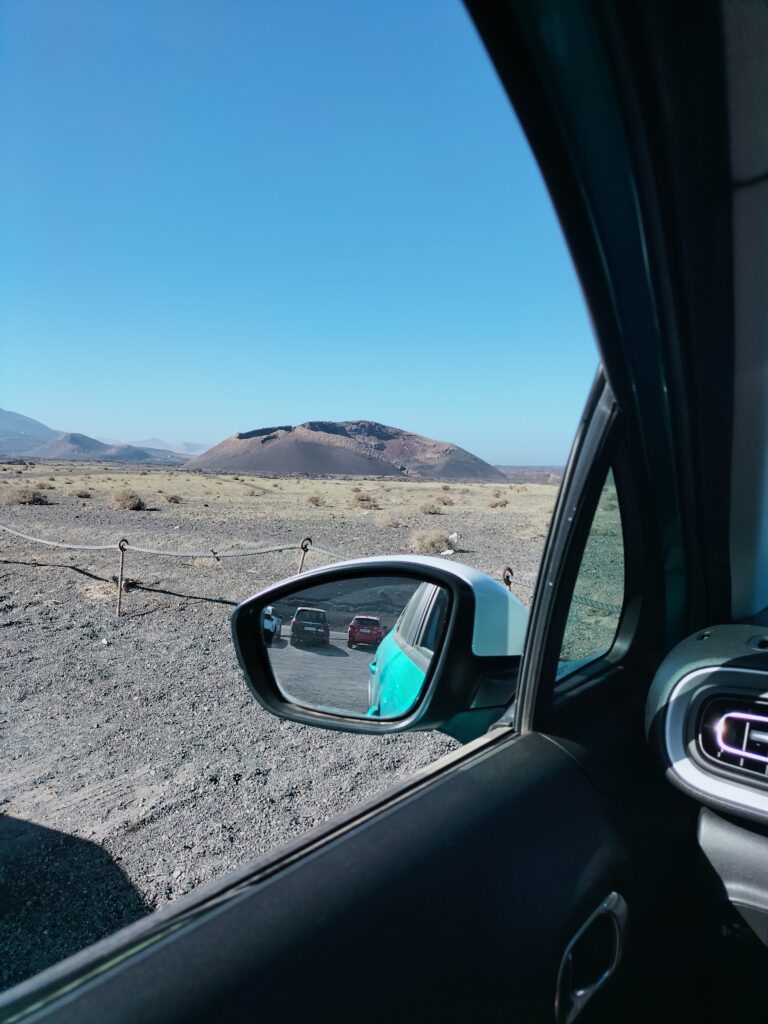
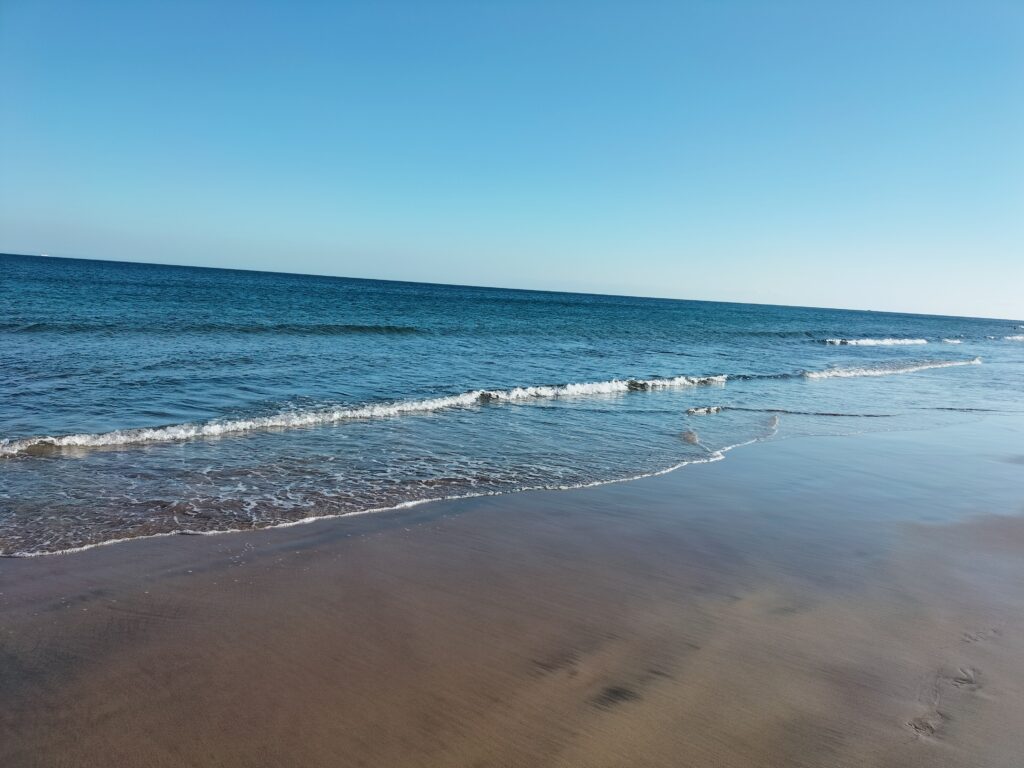
Day 5 – Jardin de Cactus and César Manrique Foundation
On the fifth day, we had the pleasure of dedicating the entire day to the incredible work of César Manrique. He was an artist, architect and environmentalist from Lanzarote who made a truly remarkable contribution to the integration of art with the natural environment.
There are so many wonderful works by him left as gifts to his island, but on this day we dedicated ourselves to visiting the cactus garden (Jardín de Cactus) in the morning and the César Manrique Foundation in the afternoon.
The Cactus Garden is located in Guatiza, in the municipality of Teguise. It’s a wonderful example of the artist’s incredible work. This wonderful botanical garden is home to thousands of cactus specimens from all over the world, arranged in a volcanic stone quarry that has been transformed into a beautiful green oasis.
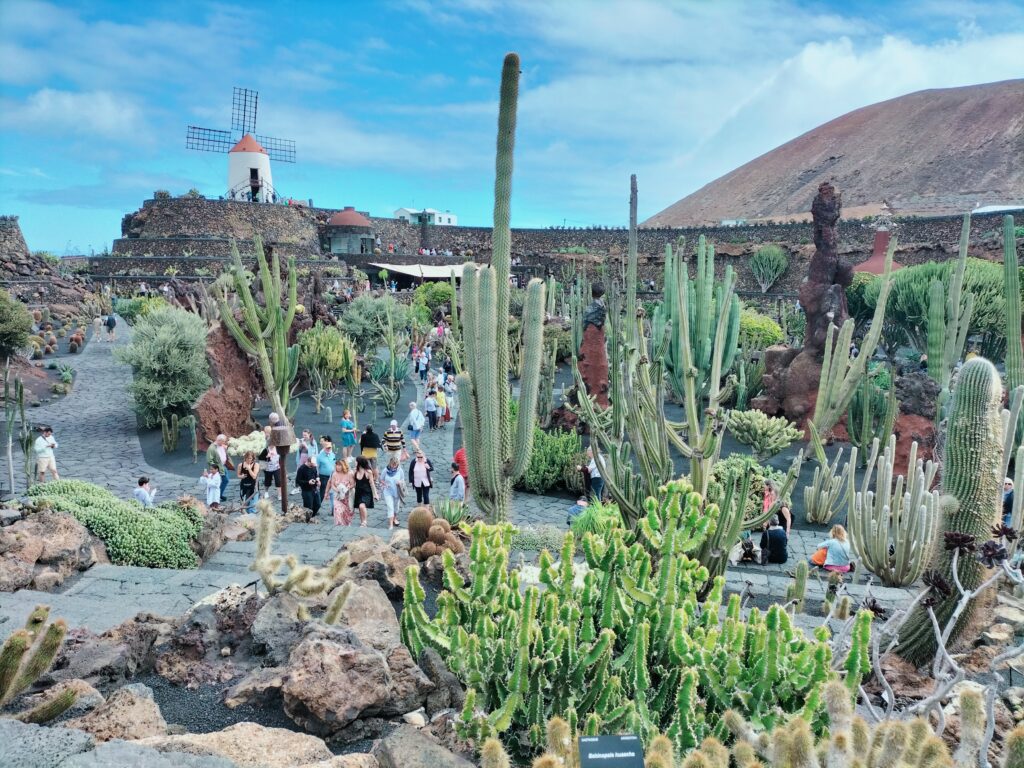
You’ll love strolling through the terraces and garden paths, taking in the amazing variety of cacti and other succulent plants. And there’s more! You’ll also find a restored windmill, which offers amazing views of the garden and the surrounding countryside. The garden is open daily from 10am to 5.45pm, but it’s always a good idea to check the updated opening hours before you visit.
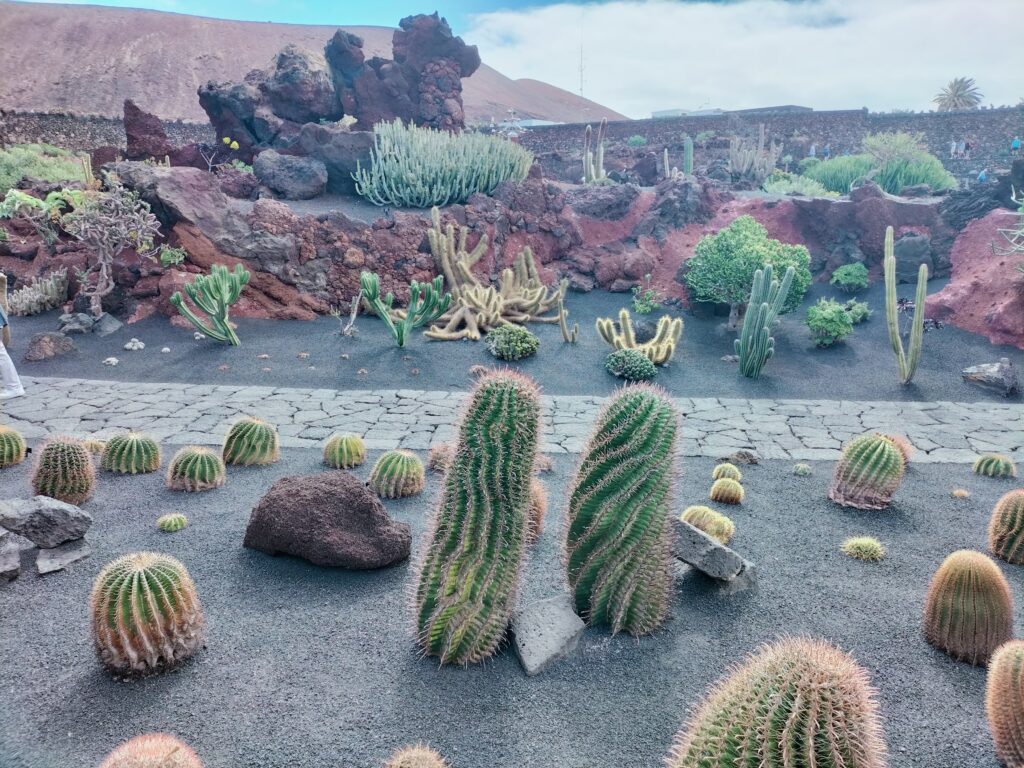
After you’ve had your fill of the garden, why not pop over to the foundation to explore Manrique’s home and studio? Manrique’s house is an absolute architectural masterpiece! It’s incredible how he managed to integrate natural elements like volcanic bubbles into modern architecture.
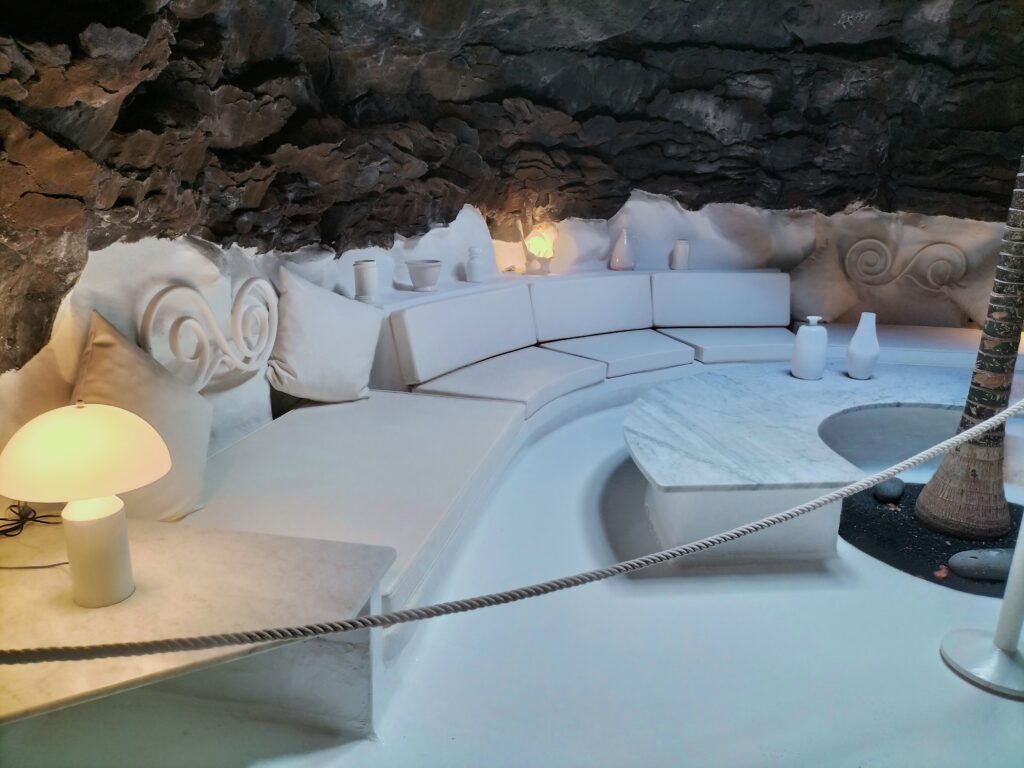
The house was lovingly constructed above a lava field and uses natural solidified lava formations. The foundation is generally open from Monday to Saturday, 10am to 6pm. Check the updated times before your visit.
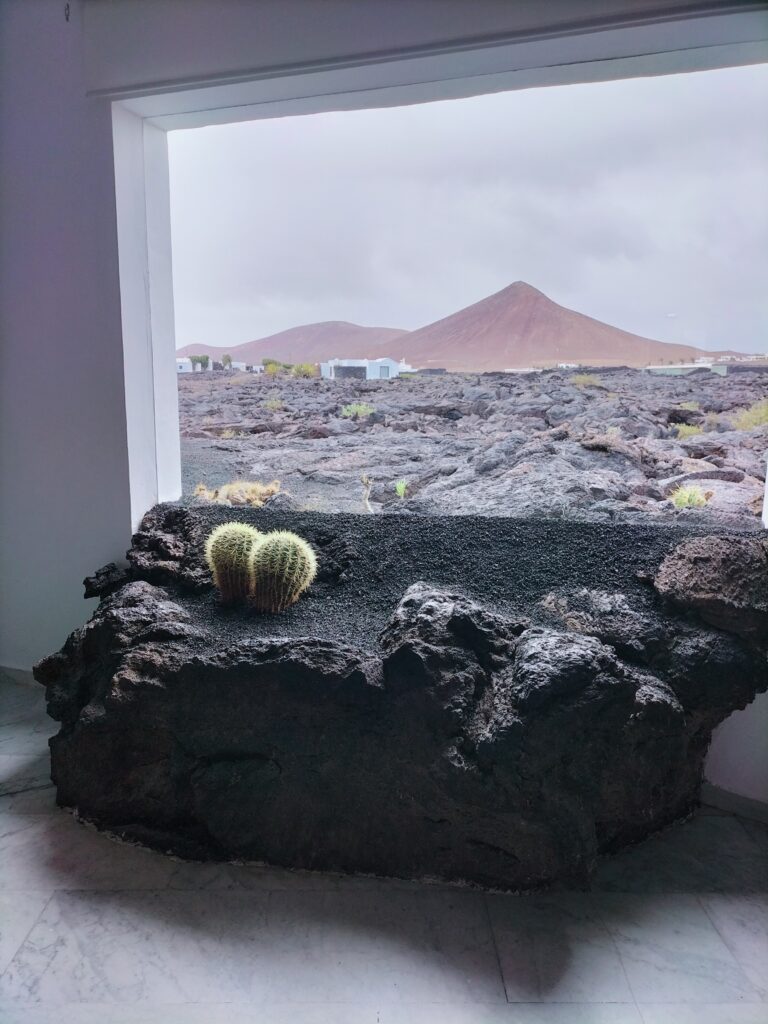
Day 6 – Mirador del Rio e Isla Graciosa
On the sixth day on the island, we were on the north side to visit another wonderful work by Cesar Manrique, the Mirador del Rio. It’s one of the most fascinating and iconic places in Lanzarote, and we loved it!
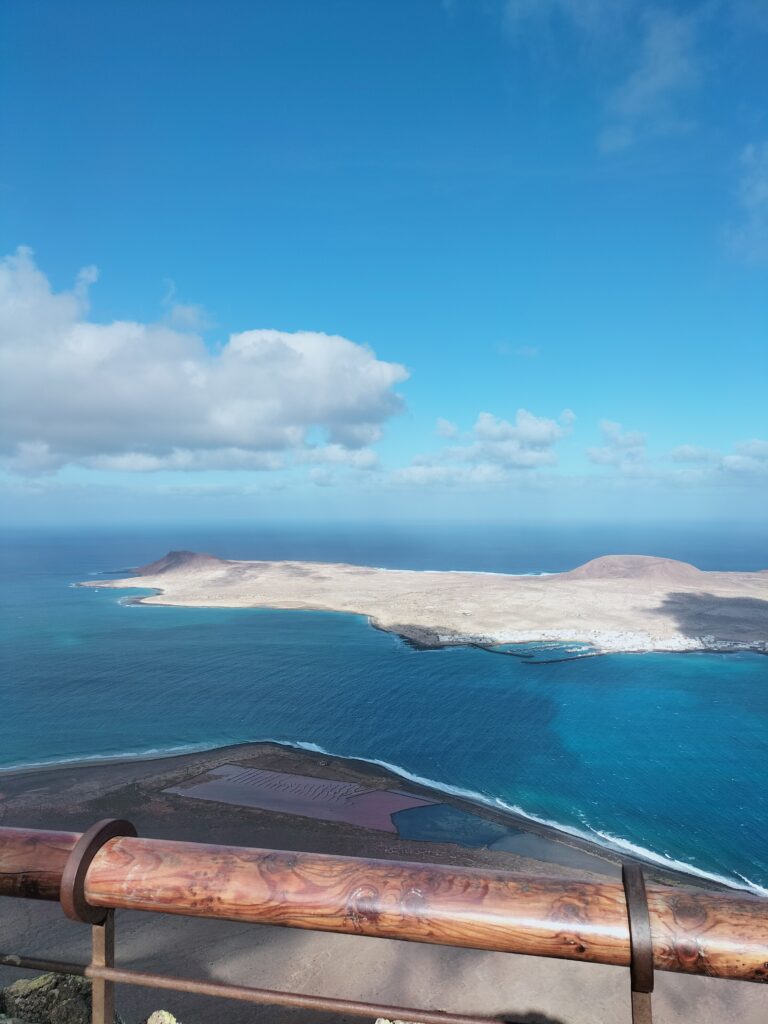
The Mirador del Rio, designed and architected by the island artist, is a wonderful panoramic point that offers spectacular views of the island of La Graciosa and the Chinijo archipelago. It’s perched on top of the Risco de Famara cliff, at an altitude of approximately 475 metres.
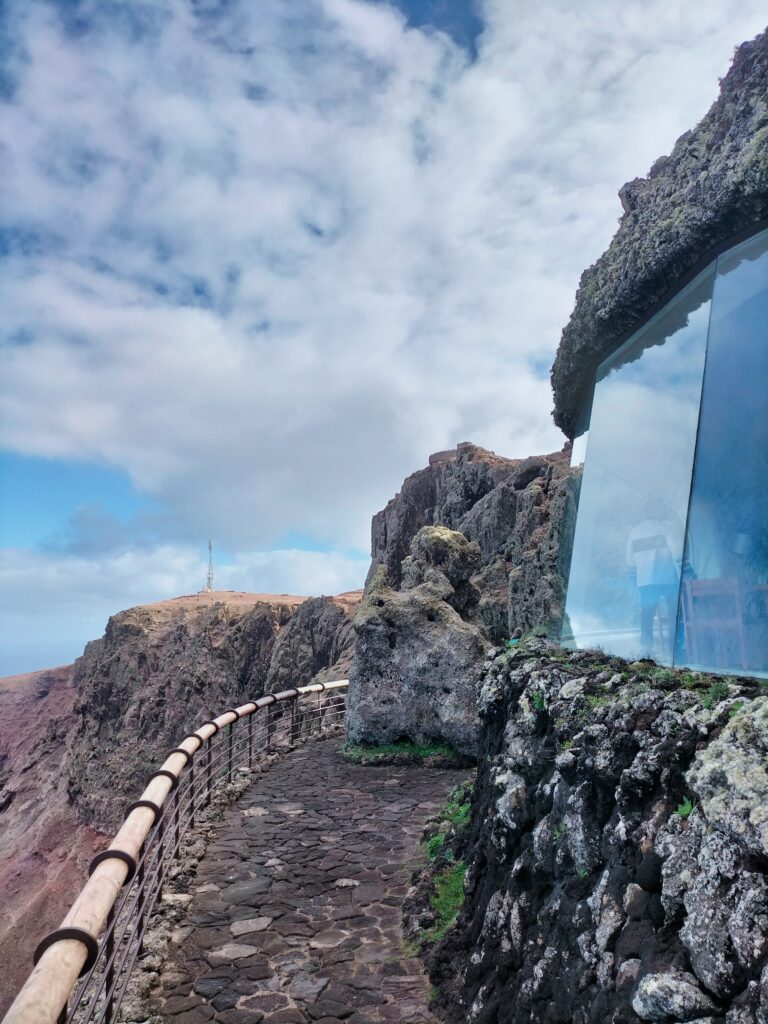
This incredible architectural feat is perfectly nestled into the volcanic rock, with large windows that frame breathtaking views of the ocean and surrounding islands. So, how do you get there? If you’re coming from Arrecife, it’s about a 40-minute drive.
Just take the LZ-1 north until you reach the village of Yé, and then follow the signs to Mirador del Río. If you’re coming from Costa Teguise, it’ll only take about 30 minutes to get there! Just hop on the LZ-1 and follow the above directions!
Once you get to Mirador, you’ll be treated to a gorgeous view of La Graciosa, a tiny island right there in front of you! You’ll love exploring the interior of the Mirador too! It’s elegantly designed and in harmony with the surrounding landscape. You’ll see that Manrique’s style is defined by the innovative use of natural light and organic curves.
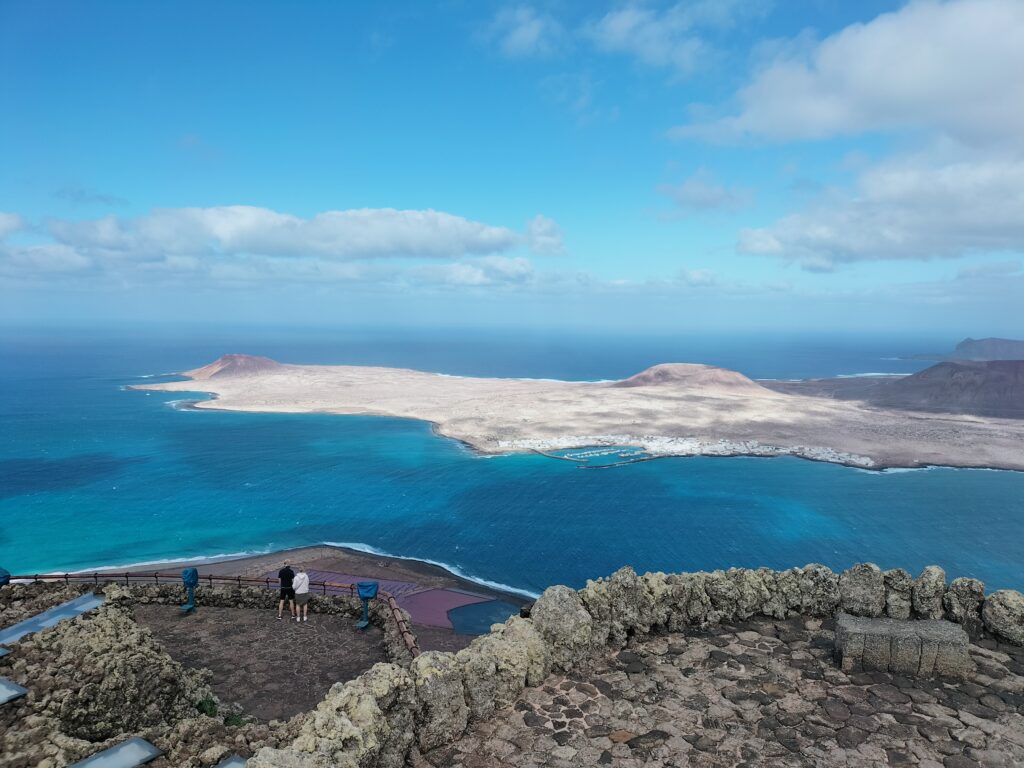
This attraction is open from 10:00 to 17:45! Just to give you a heads-up, the opening hours might change a little bit before your visit, especially during public holidays. You can check them out here.
In the afternoon, our plan was to take the ferry from Órzola and explore the beautiful Isla Graciosa by bike. We were really looking forward to it! Unfortunately, the ferry service was suspended due to rough seas, so we had to give up.
If you can make it to Isla Graciosa, you should definitely check out Caleta de Sebo and relax on Playa Francesa. It’s just a short walk or bike ride away! Check the ferry timetables here!
Day 7 – Extra day
On the last day, you can relax and enjoy the island at your own pace. There’s no need to rush! You can dedicate it to whatever you like, whether that’s relaxing on the beach, exploring the island’s many attractions, or trying out some of the local activities.
You can even explore the volcanic caves further by visiting both Jameos del Agua and Cueva de los Verdes. There you can appreciate the amazing art installations and unique natural formations.
You’ll love visiting the gorgeous village of Haría! You can explore the traditional market (if it’s market day) and take a lovely walk in the Valley of a Thousand Palms.
Or, if you’re looking for a little more relaxation, you can spend your last day on a beach on the island of your choice, somewhere you haven’t been before. From the following photo, judge for yourself what we opted for!
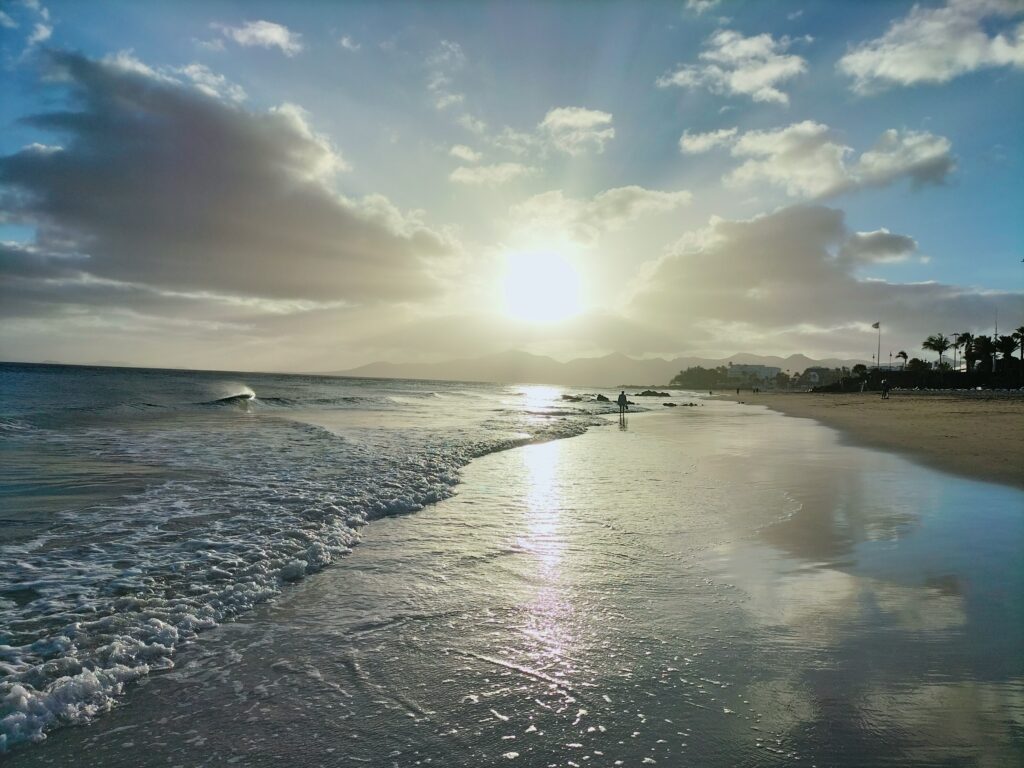
You can also choose additional activities you would like to do on your extra day in Lanzarote!
Bonus Shopping Tip
The sun in Lanzarote can be incredibly strong, making sunscreen a must for any visit. We highly recommend using Avène SPF 30 sunscreen for reliable protection. We’ve trusted this product on many of our trips, and it’s perfect for protecting your skin without feeling too heavy or greasy.
Avène’s formula is gentle and ideal for sensitive skin, which is a bonus when you’re spending long days outdoors exploring Lanzarote’s stunning landscapes. Whether you’re hiking volcanic trails or relaxing on the beach, this sunscreen ensures your skin stays safe from harmful UV rays. It’s a must-have for your packing list to enjoy the island sun worry-free!

Travel Tips from KeepMoosing
Traveling is exciting, but protecting your data should always be a priority. That’s why we trust Surfshark, a leading cybersecurity company offering tools like VPN, Antivirus, and Alert (a data breach detection system). We highly recommend Surfshark for its versatile VPN, which is perfect for keeping your digital life secure while on the go.
With Surfshark VPN, you can safely use public Wi-Fi networks without worrying about fraud or hacking, ensuring your sensitive information, such as passwords and banking details, stays protected. It also allows you to bypass geographical restrictions, so you can stream your favorite TV shows or access region-blocked websites from anywhere.
We also suggest using Surfshark VPN while planning your trip. It helps you avoid price discrimination by changing your virtual location, often leading to better deals on flights and hotels.
You can buy your subscription here!
Conclusions
No matter what your holiday goal may be, Lanzarote has got you covered! The sea is so clear, the climate is mild all year round, the volcanic scenery is just enchanting, there are excursions inside extinct volcanoes, and there are works of art set in nature!
And the best part is that all of this is possible at a very low cost, as Lanzarote is an amazingly economical tourist destination! So, go on, pack your bags and leave!
We really hope this guide about what to see in Lanzarote in 7 days will help you plan your trip! You have no more excuses! We’d love to hear your comments in the box below!
***Some of the links on our blog are affiliate links. By purchasing through these links, you help us support our work at no extra cost to you.***

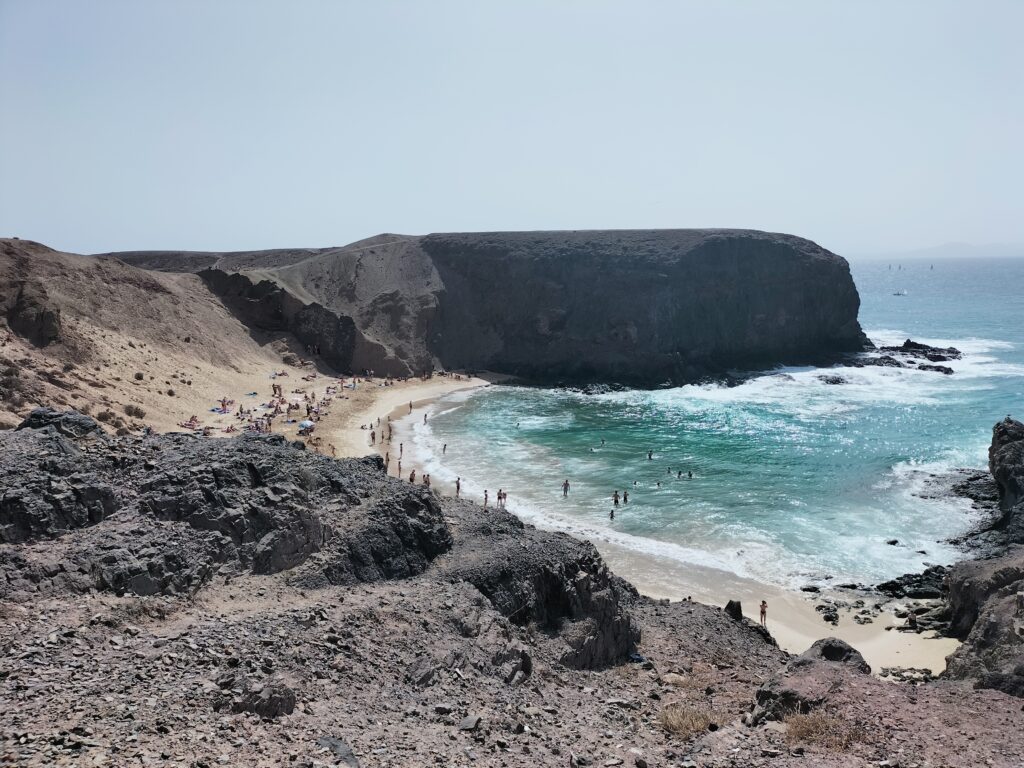

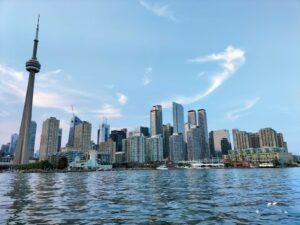
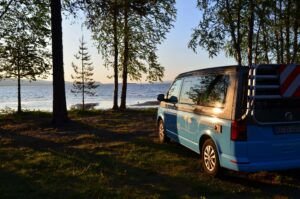
1 comment
Alessia
Wanna go and never come back :’)